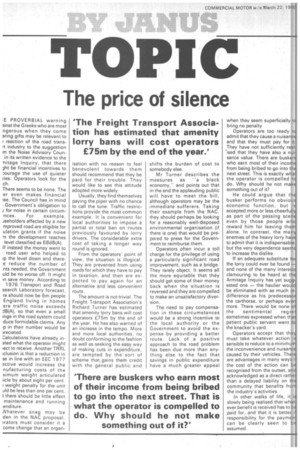TOP' C
Page 58

If you've noticed an error in this article please click here to report it so we can fix it.
The price of silence
'The Freight Transport Association has estimated that amenity lorry bans will cost operators £75m by the end of the year.'
E PROVERBIAL warning 3inst the Greeks who are most ngerous when they come aring gifts may be relevant to • reaction of the road transrt industry to the suggestion m the Noise Advisory Coun in its written evidence to the -nitage Inquiry, that there ght be financial incentives to courage the use of quieter ries. Operators look for the ch.
There seems to be none. The er even makes financial ise. The Council has in mind • Government's obligation to for noise in certain circum
nces. For example, iseholders affected by a new mproved road are eligible for ulation grants if the noise -n the development reaches level classified as 68dB(A). If instead the money went to
road user who helped to Jp the level down and theree reduce the number of nts needed, the Government uld be no worse off. It might save money. According to 1976 Transport and Road search Laboratory forecast, re should now be 6m people England living in homes ere traffic noise exceeds JB(A), so that even a small Inge in the road system could duce formidable claims. Any p in their number would be reciated.
Calculations have already inMed what the operator might lect to receive. Another TRRL iclusion is that a reduction in se in line with an EEC 1977 active would increase the nufacturing costs of the ximum weight articulated licle by about eight per cent.
weight penalty for the unit J Id be less than one per cent, I there should be little effect
maintenance and running end iture.
Nhatever snag may be den in the NAC proposal, )rators must consider it a come change that an organ isation with no reason to feel benevolent towards them should recommend that they be paid for their trouble. They would like to see this attitude adopted more widely.
Usually, they find themselves paying the piper with no chance to call the tune. Traffic restrictions provide the most common example. It is convenient for local authorities to impose a partial or total ban on routes previously favoured by lorry drivers. The considerable extra cost of taking a longer way round is ignored.
From the operators point of view, the situation is illogical. They are prevented from using roads for which they have to pay in taxation, and then are expected to pay again for an alternative and less convenient route.
The amount is not trivial. The Freight Transport Association's Richard Turner has estimated that amenity lorry bans will cost operators £.75m by the end of the year. He has also warned of an increase in the tempo. More and more local authorities, no doubt conforming to the fashion as well as seeking the easy way of making cuts in expenditure, are tempted by the sort of scheme that gains them credit with the general public and shifts the burden of cost to somebody else.
Mr Turner describes the measures as "a black economy,'" and points out that in the end the applauding public will have to meet the bill, although operators may be the immediate sufferers. Taking their example from the NAC, they should perhaps be looking for a reasonably well-disposed environmental organisation (if there is one) that would be prepared to press for the Government to reimburse them.
Operators often incur a toll charge for the privilege of using a particularly significant road improvement, such as a bridge. They rarely object. It seems all the more equitable that they should get some of their money back when the situation is reversed and they are compelled to make an unsatisfactory diversion.
The need to pay compensation in these circumstances would be a strong incentive to the local authority or the Government to avoid the expense by providing a better route. Lack of a positive approach to the road problem has been due more than anything else to the fact that savings in public expenditure have a much greater appeal
when they seem superficially t bring no penalty
Operators are too ready t admit that they cause a nuisanb and that they must pay for it They have not sufficiently re 'ised that they have also a n sance value. There are busk who earn most of their inco from being bribed to go into next street. This is exactly w the operator is compelled do. Why should he not ma something out of it?
He could argue that t busker performs no obvio economic function, but accepted more or less cheerfu as part of the passing sce even by those people w reward him for leaving th alone. In contrast, the ma enemies of the heavy lorry ha to admit that it is indispensab but the very dependence see to increase the dislike.
If an adequate substitute the lorry could ever be found and none of the many intere clamouring to be heard at t Armitage Inquiry has yet su ested one — the haulier wo be eliminated with as much difference as his predeces the carthorse, or perhaps ev more. There would be none the sentimental reg sometimes expressed when t patient public servant went the knacker's yard.
Operators accept that th must take whatever action sensible to reduce to a minim the inconvenience and nuisa caused by their vehicles. Th are advantages in many way the cost of the action can recognised from the outset, a acknowledged as a direct rat than a delayed liability on community that benefits fr the industry's activities.
In other walks of life, it slowly being realised that wh ever benefit is received has to paid for, and that it is bette responsibility for the paym can be clearly seen to assumed.
































































































































